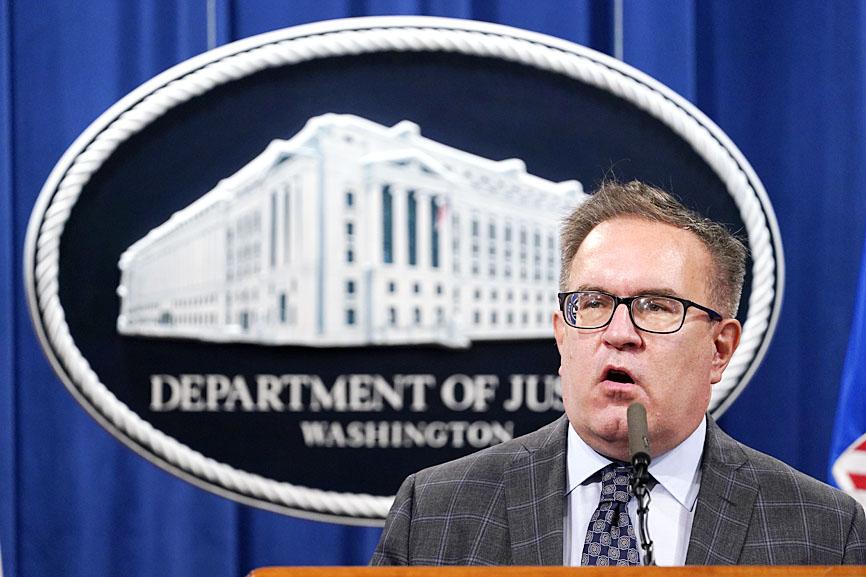Details have not yet been finalized regarding a planned visit by US Environmental Protection Agency Administrator (EPA) Andrew Wheeler next month, the Ministry of Foreign Affairs said yesterday.
Premier Su Tseng-chang (蘇貞昌) yesterday told reporters Wheeler would discuss international and environmental issues.
“Taiwan-US exchanges keep warming up... We are glad to see it and we believe it will make bilateral relations better,” Su said.

Photo: AP
Wheeler was invited to Taiwan in December last year by Minister of Foreign Affairs Joseph Wu (吳釗燮) to discuss international cooperation on environmental issues, ministry spokeswoman Joanne Ou (歐江安) said.
Ou made the remarks after a report on Thursday by the New York Times said that Wheeler is planning a three-day visit to Taiwan to start on Dec. 5, and he would also go to Costa Rica, the Dominican Republic, Ecuador and Panama in January.
The New York Times cited James Hewitt, a spokesman for Wheeler, as saying that the agency is still working through the logistics and that Wheeler was invited to Taiwan “to collaborate on issues including the Save Our Seas initiative and marine litter, air quality and children’s health.”
It also quoted two people familiar with the matter as saying that the meetings with top officials in Taiwan were “hurriedly cobbled together,” and that there were no stated policy goals for the Latin America trip.
Although representative to the US Hsiao Bi-khim (蕭美琴) on Thursday confirmed Wheeler’s visit, the ministry yesterday said in a statement that it was still finalizing details with the US.
Former US EPA administrator Gina McCarthy visited Taiwan in 2014, and this year US Undersecretary of State for Economic Growth, Energy and the Environment Keith Krach and US Secretary of Health and Human Services Alex Azar visited in September and August respectively, demonstrating the close ties between Taiwan and the US, while complying with the Taiwan Travel Act, Ou said.
The act, passed in 2018 with bipartisan support in the US Congress, allows for high-level visits by Taiwanese and US officials, which Taiwan welcomes, she said.
McCarthy’s visit, under the administration of former US president Barack Obama, fostered bilateral cooperation in promoting environmental education, and improving electronic waste management and air pollution controls under the International Environmental Partnership framework, Ou said.
The nations look forward to boosting cooperation in tackling marine waste and improving regional air quality, she added.
Presidential Office spokesman Xavier Chang (張惇涵) yesterday also welcomed high-ranking visits from the US.
Regarding the quarantine plan for Wheeler’s delegation, Central Epidemic Command Center spokesman Chuang Jen-hsiang (莊人祥) said the matter should first be explained by the foreign ministry and that the center would assist with disease prevention plans.
China yesterday said it “resolutely opposes any form of official exchanges between the US and Taiwan.”
“China will make a necessary and legitimate reaction,” Chinese Ministry of Foreign Affairs spokesman Zhao Lijian (趙立堅) told reporters.
Additional reporting by AFP

SECURITY: As China is ‘reshaping’ Hong Kong’s population, Taiwan must raise the eligibility threshold for applications from Hong Kongers, Chiu Chui-cheng said When Hong Kong and Macau citizens apply for residency in Taiwan, it would be under a new category that includes a “national security observation period,” Mainland Affairs Council (MAC) Minister Chiu Chui-cheng (邱垂正) said yesterday. President William Lai (賴清德) on March 13 announced 17 strategies to counter China’s aggression toward Taiwan, including incorporating national security considerations into the review process for residency applications from Hong Kong and Macau citizens. The situation in Hong Kong is constantly changing, Chiu said to media yesterday on the sidelines of the Taipei Technology Run hosted by the Taipei Neihu Technology Park Development Association. With

‘FORM OF PROTEST’: The German Institute Taipei said it was ‘shocked’ to see Nazi symbolism used in connection with political aims as it condemned the incident Sung Chien-liang (宋建樑), who led efforts to recall Democratic Progressive Party (DPP) Legislator Lee Kun-cheng (李坤城), was released on bail of NT$80,000 yesterday amid an outcry over a Nazi armband he wore to questioning the night before. Sung arrived at the New Taipei City District Prosecutors’ Office for questioning in a recall petition forgery case on Tuesday night wearing a red armband bearing a swastika, carrying a copy of Adolf Hitler’s Mein Kampf and giving a Nazi salute. Sung left the building at 1:15am without the armband and apparently covering the book with a coat. This is a serious international scandal and Chinese

COUNTERINTELLIGENCE TRAINING: The ministry said 87.5 percent of the apprehended Chinese agents were reported by service members they tried to lure into becoming spies Taiwanese organized crime, illegal money lenders, temples and civic groups are complicit in Beijing’s infiltration of the armed forces, the Ministry of National Defense (MND) said in a report yesterday. Retired service members who had been turned to Beijing’s cause mainly relied on those channels to infiltrate the Taiwanese military, according to the report to be submitted to lawmakers ahead of tomorrow’s hearing on Chinese espionage in the military. Chinese intelligence typically used blackmail, Internet-based communications, bribery or debts to loan sharks to leverage active service personnel to do its bidding, it said. China’s main goals are to collect intelligence, and develop a

A US Marine Corps regiment equipped with Naval Strike Missiles (NSM) is set to participate in the upcoming Balikatan 25 exercise in the Luzon Strait, marking the system’s first-ever deployment in the Philippines. US and Philippine officials have separately confirmed that the Navy Marine Expeditionary Ship Interdiction System (NMESIS) — the mobile launch platform for the Naval Strike Missile — would take part in the joint exercise. The missiles are being deployed to “a strategic first island chain chokepoint” in the waters between Taiwan proper and the Philippines, US-based Naval News reported. “The Luzon Strait and Bashi Channel represent a critical access